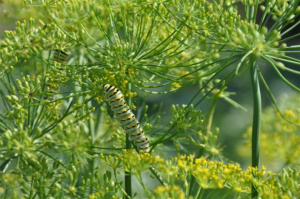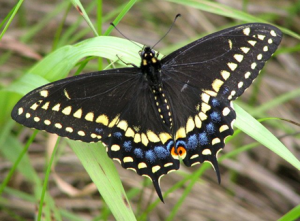by
Kitty Smith, Texas Master Naturalist, Indian Trail Chapter
I think butterflies are beautiful so I decided to encourage them. I read that caterpillars feed on parsley, dill, and fennel. So when I planted my vegetable garden this spring I included all three. I soon discovered, “If you plant it they will come.”
 Caterpillar – Black Swallowtail (Papilio polyxenes asterius Stoll), Ellis County, 6/28/13 |
 |
Order: Lepidoptera
The black swallowtail is a black butterfly with yellow markings near the margins of the forewings and hind wings and more limited blue and red markings on the hind wings. Its wing span can reach 4 ½ inches. Full grown parselyworms or caterpillars can reach 2 inches in length and are smooth and green, marked with black bands and yellow spots.
Caterpillars have chewing mouthparts. Host plants of the caterpillar include members of the parsley family (Umbelliferae) including carrot, parsley, dill, fennel and Queen Anne’s lace and some members of the Rutaceae (Ruta graveolens and Thamnosma texana). This caterpillar is bad tasting to birds and other predators because of toxins absorbed from the host plants. Like other larvae of swallowtail butterflies, parselyworms have a defensive structure, called an osmeterium, right behind the head. This structure is usually concealed. However, when disturbed this “Y” or “V” shaped organ is inverted. It emits a strong odor that is apparently distasteful to predators. This butterfly is easy to attract and raise by planting dill or fennel in your vegetable garden. For additional information, contact your local Texas A & M AgriLife Extension Service agent or visit: https://insects.tamu.edu/fieldguide/#lepidoptera.
Do you think nature should be part of our everyday life, not just somewhere to go on the weekends? You are invited to attend our free, open-to-the-public, monthly program every fourth Monday at 7 pm at the Red Oak Library, 200 Lakeview Pkwy, Red Oak, TX. For more information on the Indian Trail Master Naturalist Chapter, contact the Texas A&M AgriLife Extension Service at 972-825-5175 or visit our website: http://txmn.org/indiantrail/.


